Most people think dehydration just makes you thirsty, but here’s what I’ve discovered: when you get even a little dehydrated, your body starts doing some pretty wild things that can leave you feeling dizzy and confused. Your body basically starts sending mixed signals like a bad GPS – “Turn left! No wait, turn right! Actually, just sit down before you fall over.”
According to Neurologic Wellness Institute, studies show that after exercise-induced dehydration, people have measurably worse balance scores when their inner ear balance system is tested. This proves that dehydration directly messes with the fluid in your inner ear canals.
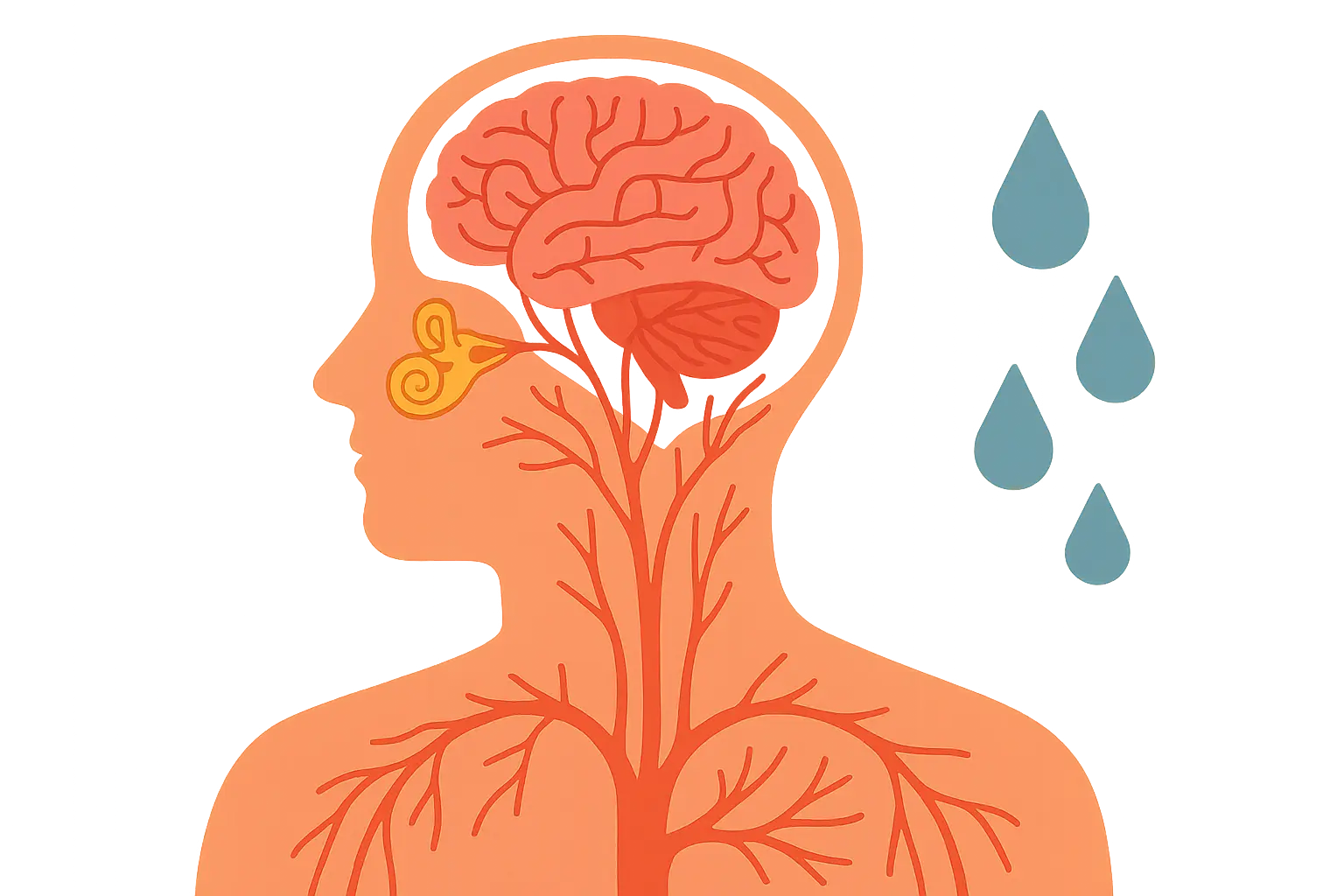
Table of Contents
- What’s Really Happening When You Feel Dizzy
- Why Your Brain Gets Confused When You’re Thirsty
- When Your Spinal Fluid Gets Out of Whack
- The Energy Crisis Inside Your Cells
- Why Dehydration Makes Your Body Attack Itself
- Timing Is Everything: When Dizziness Hits Hardest
- Spotting the Warning Signs Before You Fall Over
- Smart Rehydration That Actually Works
- The Fatigue-Dizziness Connection Most People Miss
- The Individual Variation Factor Nobody Talks About
- The Recovery Timeline Reality Check
- How Enov.one Tackles Dehydration-Related Dizziness
TL;DR
- Your body’s pressure sensors become hypersensitive with just 2% fluid loss, sending mixed signals that trigger dizziness
- Dehydration messes with the electrical balance in your inner ear and brain, affecting how you know which way is up
- Your cells produce 15% less energy when you’re mildly dehydrated, starving your balance centers
- Morning hours create perfect storm conditions for dizzy spells because of hormone changes
- Simple brain tests can predict dizziness episodes before they happen
- Proper rehydration needs specific salt-to-water ratios, not just chugging water
- Everyone’s different – what works for others might not work for you
What’s Really Happening When You Feel Dizzy
I used to think dizziness from dehydration was just about low blood pressure, but it’s actually way more complicated. Your body has these specialized pressure detectors that become incredibly sensitive when you lose fluids, creating a domino effect that scrambles the signals telling your brain which way is up.
Recent medical reporting backs this up. As “Woman’s World” explains, “when your body lacks adequate fluids, it affects blood volume and blood pressure, leading to reduced blood flow to the brain, which can result in dizziness,” according to Dr. Nilda Agnes Abellera, MD, Founder and Medical Director of Infuze MD.
Can dehydration cause dizziness? Absolutely, and the way it happens is way more sophisticated than most people realize. When you become dehydrated, your body’s network of sensors starts malfunctioning in ways that directly mess with your sense of balance.
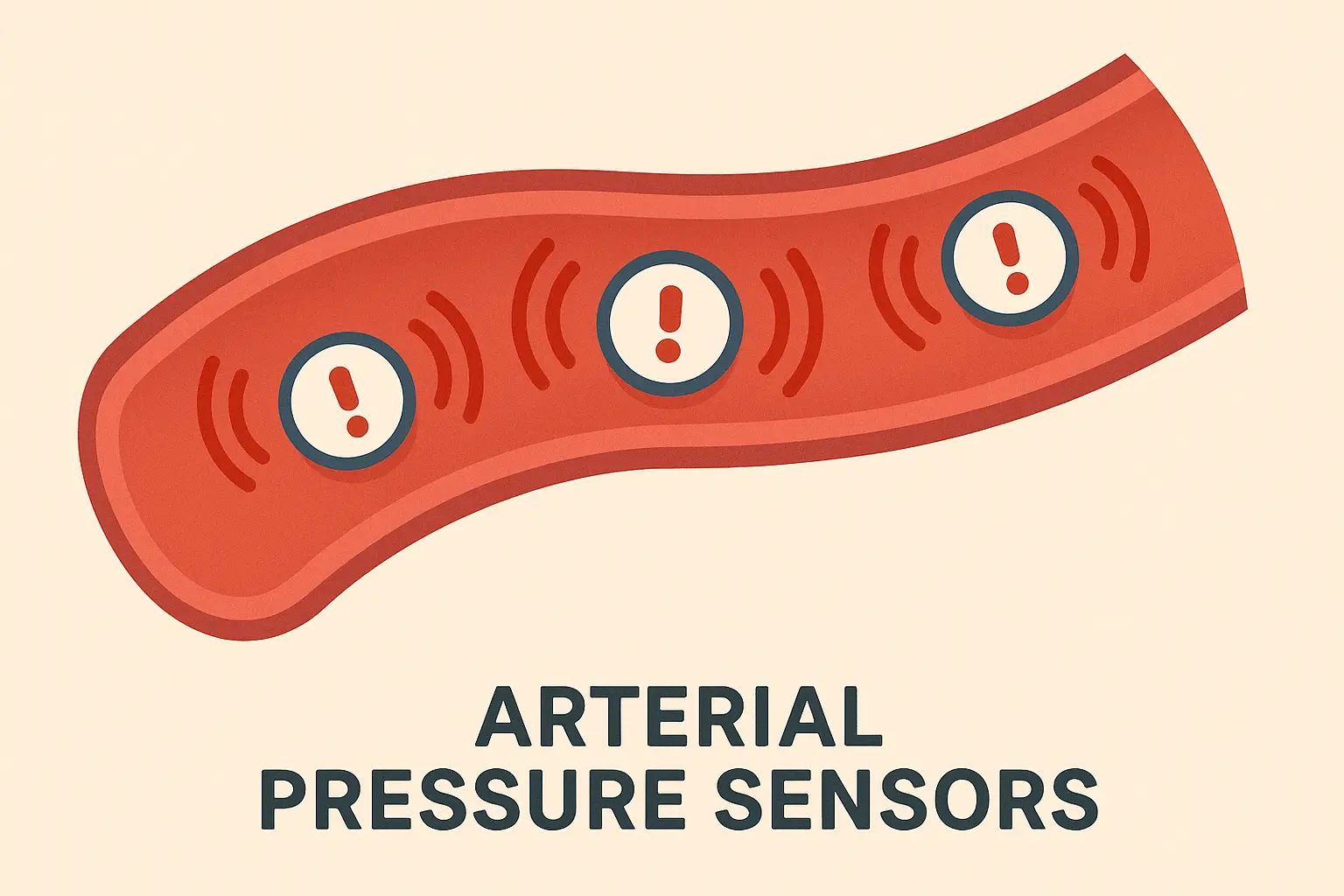
Your Arteries Start Lying to Your Brain
Those pressure sensors in your neck arteries (the big ones you can feel your pulse in) begin malfunctioning when your blood volume drops by as little as 2%. These sensors normally provide steady, reliable information about your blood pressure to your brain. But dehydration makes them hypersensitive and erratic, sending panic signals that cause your brain to overcompensate with dramatic blood pressure swings – and that’s when the room starts spinning.
Think of it like having a smoke detector that goes off every time you make toast. Your brain can’t trust the information it’s getting, so it starts overreacting to everything. These sensors essentially become unreliable witnesses, telling your brain there’s a crisis when there might not be one, or missing actual problems entirely.
| Blood Volume Loss | How Your Sensors React | Dizziness Level | Recovery Time |
|---|---|---|---|
| 1-2% | Mild hypersensitivity | Light-headedness | 15-30 minutes |
| 2-4% | Moderate dysfunction | Room spinning | 30-60 minutes |
| 4-6% | Severe malfunction | Can’t stand up | 1-2 hours |
| 6%+ | Critical failure | Fainting risk | Need medical help |
When Blood Gets Stuck in the Wrong Places
Dehydration creates a “pooling effect” where blood gets stuck in your arms and legs instead of efficiently returning to your heart. This forces your brain into constant recalculation mode, trying to figure out your position in space while dealing with inconsistent blood flow patterns. The result? That persistent feeling of unsteadiness that makes you grab onto walls and furniture.
When you’re properly hydrated, your blood vessels work together like a well-coordinated team. But when you’re dehydrated, this coordination breaks down, leaving your brain struggling to maintain equilibrium. It’s like trying to balance on a wobbly chair while someone keeps moving it.
Sarah, a 34-year-old teacher, noticed she felt dizzy every afternoon around 2 PM. After tracking her fluid intake, she discovered she was only drinking coffee in the morning and nothing else until dinner. By drinking 4 ounces of water every hour starting at 10 AM, her afternoon dizziness episodes completely disappeared within one week. Her experience shows how predictable these patterns can be once you start paying attention.
Why Your Brain Gets Confused When You’re Thirsty
Beyond blood flow issues, dehydration creates electrical chaos in your nervous system by messing up the delicate balance of minerals that carry signals between your brain and inner ear. These mineral imbalances don’t just affect your muscles – they specifically target your inner ear’s balance system that keeps you upright and oriented in space.
Understanding how dehydration affects your brain becomes crucial when exploring magnesium deficiency, which directly impacts the electrical pathways that maintain proper balance and spatial orientation. When you’re dehydrated, your body can’t maintain the precise mineral concentrations needed for optimal nerve function.
Dehydration symptoms extend far beyond simple thirst. Your nervous system depends on exact ratios of sodium, potassium, and other minerals to function properly. When these get thrown off by fluid loss, the electrical signals that coordinate balance and spatial awareness become unreliable.
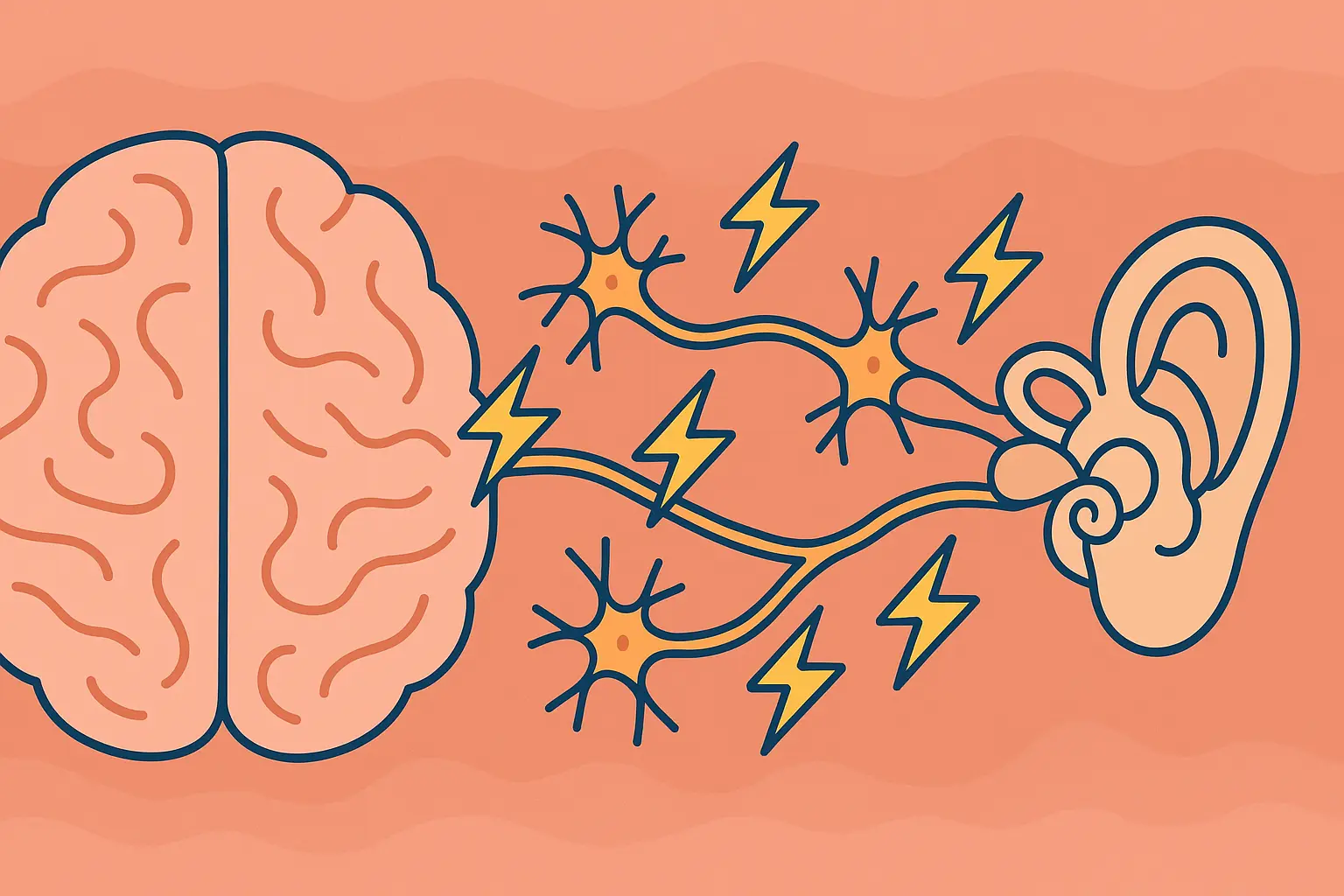
Your Cellular Batteries Start Dying
Every nerve signal in your body depends on sodium and potassium pumps working perfectly. Dehydration throws off this balance, particularly affecting your inner ear’s ability to process spatial information accurately. Think of it as your inner ear’s GPS system getting scrambled – it can’t tell your brain where you are in relation to gravity and movement.
When you’re dehydrated, these cellular pumps can’t maintain the electrical gradients necessary for proper nerve transmission. This creates a cascade of communication failures between your inner ear and brain, resulting in that disorienting feeling where you can’t quite trust your sense of balance.
When Your Calming Chemicals Go Missing
Low fluid levels reduce magnesium availability, which directly impacts your brain’s natural calming chemical called GABA. When GABA isn’t working properly, your nervous system gets stuck in an excitatory state. This creates dizziness, but also that anxious, spatially confused feeling that often accompanies dehydration episodes.
I’ve found that people who are chronically dehydrated often report feeling “wired but tired” – their nervous system is overstimulated while their body lacks the resources to function optimally. This combination frequently shows up as dizziness combined with anxiety or restlessness.
Your Inner Ear’s Motion Detectors Get Jammed
The concentrated blood chemistry from fluid loss interferes with calcium channels in your inner ear. These channels control the tiny hair cells responsible for detecting motion and balance. When they malfunction, you get false motion sensations – feeling like you’re moving when you’re standing still, or experiencing that “elevator drop” sensation when nothing’s actually happening.
Your inner ear contains some of the most sensitive motion-detecting equipment in your body. When you’re properly hydrated, these systems work with incredible precision. But dehydration disrupts the fluid composition in your inner ear, causing these delicate sensors to send incorrect information to your brain about your body’s position and movement.
When Your Spinal Fluid Gets Out of Whack
Here’s something most people don’t know: dehydration affects the pressure and composition of the fluid that cushions your brain and spinal cord. Changes in this fluid directly impact brain function and can trigger positional dizziness that gets worse when you move your head or change positions.
Your brain fluid isn’t just padding – it’s an active transport system that helps maintain optimal brain function. When you’re dehydrated, both the production and absorption of this fluid can become disrupted, creating pressure changes that affect your sense of balance and spatial orientation.
Your Brain’s Pressure System Goes Haywire
Reduced overall body fluid affects how this brain fluid gets produced and absorbed. This creates pressure fluctuations inside your skull that interfere with normal brain function. You might notice this as dizziness that gets worse when you bend over, stand up quickly, or turn your head – all movements that change pressure inside your head.
When you’re properly hydrated, your brain maintains consistent pressure through carefully regulated fluid production and drainage. But dehydration can disrupt this delicate balance, leading to pressure changes that trigger dizziness, especially with position changes. This explains why some people feel fine sitting still but become dizzy when they move around.
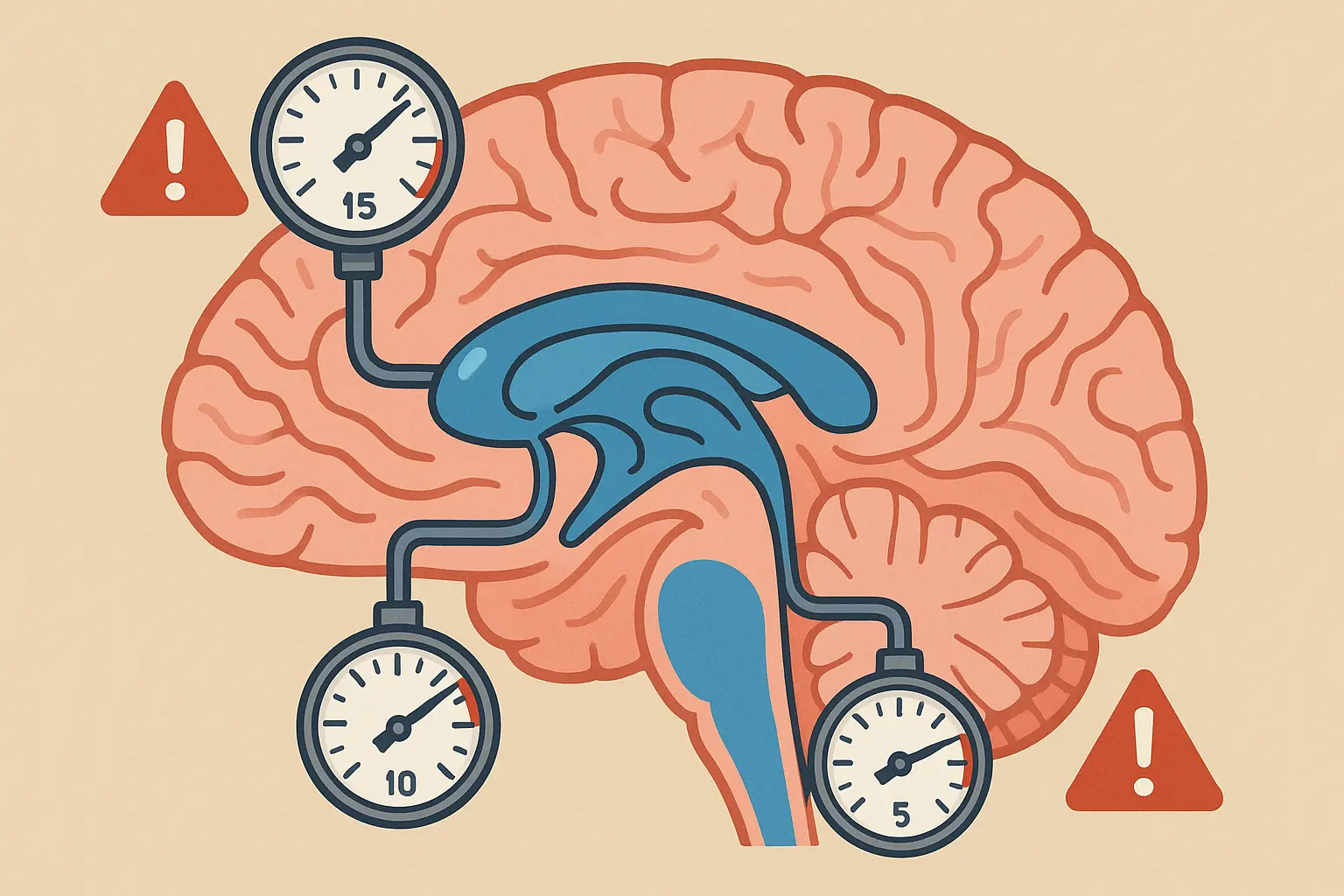
The Energy Crisis Inside Your Cells
Dehydration triggers a metabolic chain reaction that goes way beyond simple blood volume changes. Your cells literally can’t produce energy efficiently when they’re dehydrated, and this energy crisis hits your balance centers particularly hard since they’re some of the most energy-demanding parts of your nervous system.
This cellular energy crisis extends beyond simple hydration, connecting to broader mitochondrial health issues that affect how your cells produce the energy needed for optimal balance and brain function. When you’re dehydrated, your cellular powerhouses can’t function at full capacity.
Water isn’t just for hydration – it’s essential for optimal cellular energy production. Even mild dehydration can reduce cellular energy production by up to 15%. This directly impacts the energy-intensive processes required for balance and spatial orientation, leaving your brain and inner ear struggling to maintain normal function.
Your Cellular Power Plants Start Failing
Research shows that cellular energy production can drop by up to 15% during mild dehydration, as documented by MV Pediatrics, which notes that “dizziness is usually due to reduced blood flow to the brain” and that “mild dehydration is a common cause of dizziness.”
When you’re dehydrated, your cells face a double challenge: they have less fluid available for basic processes, and the concentration of waste products increases, further impairing cellular function. This creates a downward spiral where energy production becomes increasingly inefficient.
Your balance centers require enormous amounts of energy to process the constant stream of sensory information from your inner ear, eyes, and movement sensors throughout your body. When cellular energy production drops, these systems can’t keep up with the demands, resulting in dizziness and spatial disorientation.
When Cellular Waste Builds Up
Dehydration concentrates cellular waste products and reduces the efficiency of your cells’ energy-producing machinery. Your cellular power system can’t work properly when waste products accumulate, limiting energy availability to the demanding balance centers in your brain and inner ear.
Mark, a 28-year-old software developer, experienced daily 3 PM energy crashes followed by dizziness. After taking 200mg magnesium with lunch and increasing water intake by 16 ounces between noon and 2 PM, his energy levels stabilized and dizziness episodes reduced by 80% within two weeks. His case shows how addressing both hydration and cellular energy support can dramatically improve symptoms.
Why Dehydration Makes Your Body Attack Itself
Dehydration triggers low-grade inflammation throughout your body that specifically targets the delicate structures of your balance system. This creates a secondary pathway to dizziness that can persist even after you’ve rehydrated, explaining why sometimes drinking water doesn’t immediately fix the problem.
When you’re dehydrated, your immune system interprets the stress as a potential threat and activates inflammatory pathways. This inflammation can affect the sensitive balance organs in your inner ear, creating dizziness that persists even after fluid levels return to normal.
Your Immune System Gets Confused
Concentrated blood from fluid loss activates inflammatory chemicals that can cross into your brain and directly irritate balance-processing centers. This creates persistent dizziness that may last hours after drinking water, because the inflammation needs time to resolve even after fluid levels normalize.
I’ve observed that people who experience chronic dehydration often develop heightened inflammatory responses. Their immune systems become hypersensitive to fluid loss, triggering inflammatory cascades that can take hours or even days to fully resolve, even with proper rehydration.
The Allergy-Like Response You Never Expected
Dehydration stress triggers the release of histamine – the same chemical involved in allergic reactions. This affects inner ear fluid composition and creates allergy-like symptoms including dizziness and spatial disorientation, even when you’re not exposed to any actual allergens. It’s your body’s stress response gone haywire.
This histamine response can create a vicious cycle where dehydration triggers inflammation, which worsens dizziness, which increases stress, which triggers more histamine release. Breaking this cycle requires addressing both the hydration issue and the inflammatory response.

Timing Is Everything: When Dizziness Hits Hardest
Here’s something that’ll surprise you: dehydration’s impact on dizziness isn’t constant throughout the day. Your susceptibility varies dramatically based on your body’s natural rhythms, hormone fluctuations, and individual patterns. Understanding these timing patterns can help you predict and prevent the worst episodes.
The timing of dehydration symptoms often correlates with sleep hygiene patterns, as overnight fluid loss and morning hormone fluctuations create perfect conditions for dizziness episodes. Your body loses significant fluid during sleep through breathing and sweating, setting you up for morning vulnerability.
Medical experts are increasingly recognizing timing factors in dehydration-related symptoms. American Heart Association reports that “during the first few weeks and months of pregnancy, many women experience nausea and vomiting that can be accompanied by dizziness or lead to dehydration, which in turn may cause dizziness,” emphasizing the importance of timing in symptom development.
The Morning Danger Zone
Your body’s stress response to dehydration involves complex hormone cascades that can either amplify or mask dizziness symptoms. The interaction between cortisol (your stress hormone) and your main fluid-regulating hormone creates specific vulnerability windows where dizziness risk skyrockets.
Morning cortisol surges are designed to help you wake up and face the day, but when combined with overnight dehydration, they can create perfect storm conditions for dizziness. Your stress hormones are elevated while your fluid reserves are depleted – a combination that frequently triggers balance problems.
Why 10 AM Might Be Your Worst Time
Natural stress hormone peaks combined with overnight dehydration create perfect storm conditions. This typically occurs 2-4 hours after waking when stress hormones are elevated but hydration hasn’t been restored. Your body is essentially running on stress chemicals while being fluid-depleted – a recipe for severe dizziness.
Your adrenal glands pump out cortisol to get you moving in the morning, but this hormone also affects fluid balance and blood pressure regulation. When you’re already dehydrated from overnight losses, this cortisol surge can overwhelm your body’s ability to maintain stable blood pressure and circulation to your brain.
When Your Backup Systems Fail
Chronic mild dehydration can exhaust your body’s fluid-regulating hormone response mechanisms. This hormone normally helps maintain proper fluid and mineral balance, but constant dehydration stress can wear out this system, leading to progressively worsening dizziness symptoms as your body loses its ability to compensate.
The Hormone Feedback Loop That Backfires
The complex feedback loops involving your body’s water-conserving hormone can create paradoxical situations where your body’s attempts to conserve water actually worsen dizziness through concentrated urine production and altered blood chemistry.
Why Some People Are More Sensitive
Individual variations in hormone receptor sensitivity explain why some people develop severe dizziness with minimal dehydration while others remain stable with significant fluid loss. Your genetic makeup literally determines how sensitive you are to dehydration-induced dizziness.
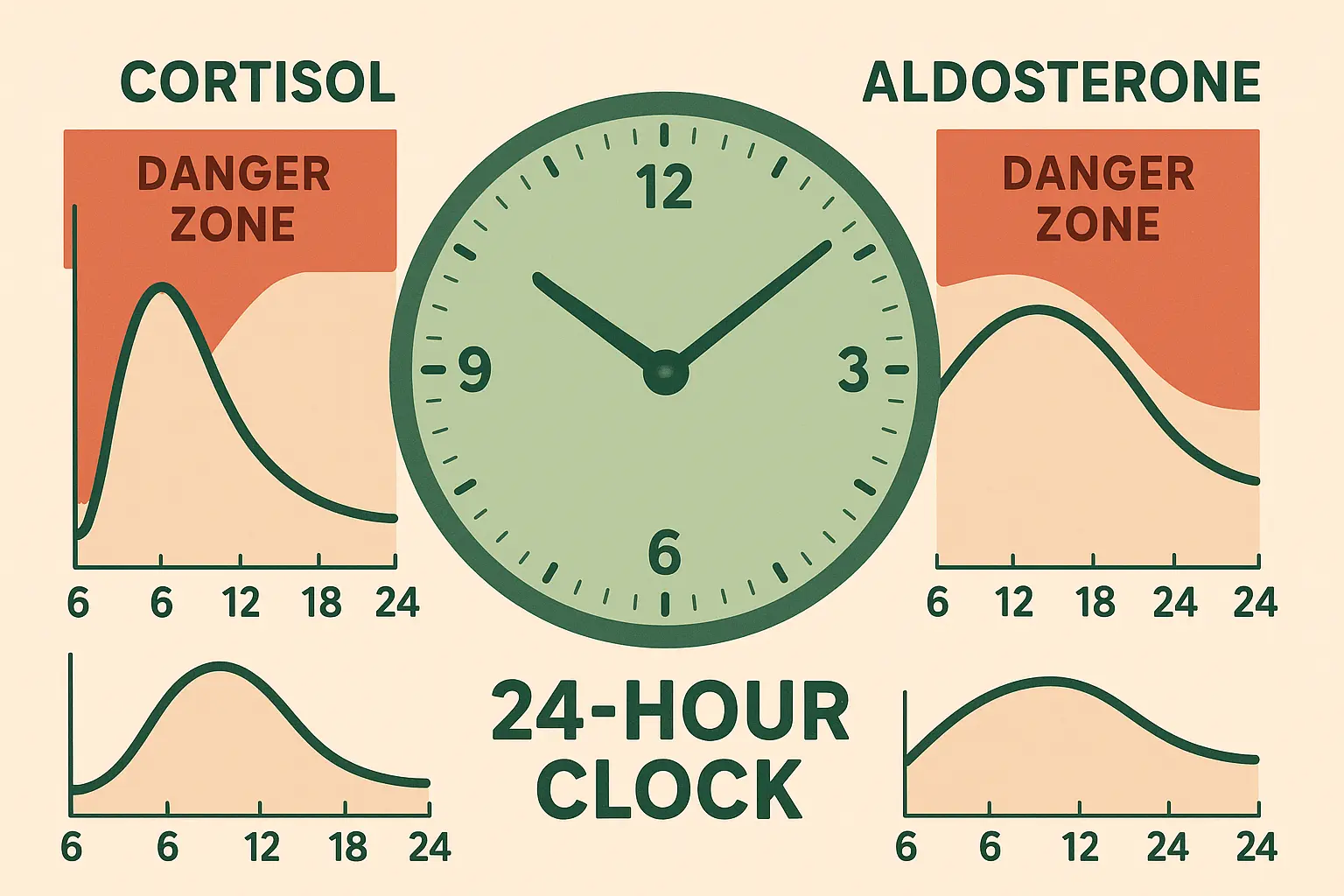
Spotting the Warning Signs Before You Fall Over
Understanding the subtle early warning signs allows you to take action before symptoms become severe. Most people wait until they’re already dizzy to address dehydration, but I’ve discovered there are reliable predictive signs that appear much earlier in the process.
Early detection of dehydration requires understanding the subtle weird physical symptoms anxiety can create, as many people mistake dehydration-induced dizziness for anxiety-related symptoms. The overlap between these conditions makes accurate identification crucial for effective treatment.
Recognizing when you’re becoming dehydrated before full symptoms develop gives you a significant advantage. Your body provides multiple warning signals, but most people either ignore them or attribute them to other causes.
Your Brain Gives You Clues Before Your Body Does
Developing personal awareness of your unique dehydration-dizziness pattern allows for intervention before symptoms become debilitating. The key is focusing on individual triggers and response patterns rather than waiting for obvious signs of dehydration to appear.
Mental tasks requiring spatial processing become disproportionately difficult during early dehydration. This serves as an early warning system that’s more sensitive than traditional thirst mechanisms. I recommend performing a simple mental rotation task (like visualizing objects turning) every 2 hours, noting when this becomes more difficult than usual, then immediately consuming 8-12 oz of electrolyte solution.
Dehydration Warning Signs Checklist:
- Mental rotation tasks become more difficult
- Heart rate increases >30 BPM upon standing
- Mood becomes more irritable than usual
- Concentration requires more effort
- Skin takes longer to bounce back when pinched
- Urine color darker than pale yellow
- Energy levels drop below 3/5 on personal scale
- Headache develops without other cause
The Mental Rotation Test That Could Save Your Day
Try this simple test: close your eyes and imagine a three-dimensional object rotating slowly. If this mental exercise feels significantly harder than usual, you’re likely entering early dehydration. This brain marker appears before thirst or other obvious symptoms of dehydration show up.
Your Heart Rate Tells the Real Story
Changes in heart rate and blood pressure upon standing become exaggerated during dehydration, providing an objective measure that predicts dizziness risk. Try this: measure your heart rate while lying down for 2 minutes, then stand quickly and measure again at 30 seconds and 2 minutes. If the increase exceeds 30 BPM or you feel dizzy, implement immediate rehydration protocols.
Medical professionals note that after 2 hours of rest and fluids, some people still feel dizzy, as documented by MV Pediatrics, which indicates that the recovery timeline varies significantly between individuals and depends on the severity of dehydration.
The Brain Fog Nobody Talks About
Concentration difficulties and decision-making impairment occur at just 1-2% dehydration levels, serving as early predictors of impending dizziness that most people attribute to stress or fatigue instead of fluid loss.
Your brain is approximately 75% water, making it extremely sensitive to even minor changes in hydration status. When you’re properly hydrated, mental tasks feel effortless. But as dehydration progresses, mental clarity diminishes noticeably before physical symptoms appear.
When Your Mood Becomes a Warning System
Emotional instability and increased irritability often precede dizziness by 30-60 minutes. Dehydration affects brain chemical balance before reaching levels severe enough to impact blood pressure and circulation, so mood changes can serve as your personal early warning system.
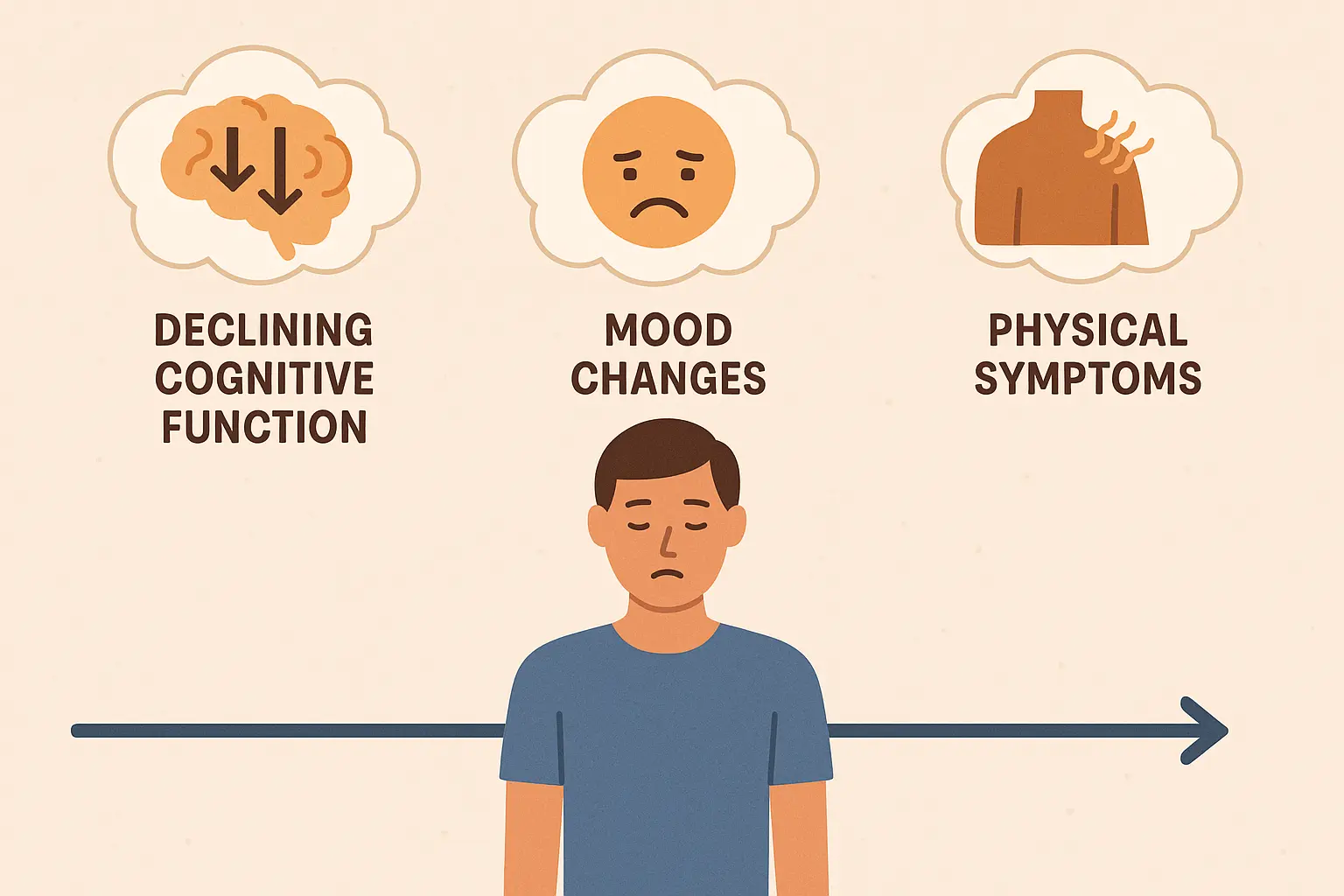
Smart Rehydration That Actually Works
Effective treatment of dehydration-induced dizziness requires specific strategies that address the underlying mechanisms rather than just replacing fluid volume. Plain water often isn’t enough – you need targeted approaches that restore mineral balance and support cellular function.
Effective rehydration goes beyond water intake and often requires addressing underlying hormonal imbalance issues that affect fluid retention and cellular hydration at the deepest levels. Your hormone system plays a crucial role in how well your body utilizes the fluids you consume.
The Science of Proper Rehydration
Using solutions that match your body’s natural salt-to-water balance provides faster relief from dizziness than plain water. This immediately addresses mineral imbalances without further disrupting cellular function.
| Rehydration Method | Mineral Balance | Absorption Speed | Dizziness Relief Time | Best Use Case |
|---|---|---|---|---|
| Plain Water | Poor | Slow | 60-90 minutes | Mild dehydration only |
| Sports Drinks | Moderate | Medium | 30-60 minutes | Exercise-related fluid loss |
| DIY Electrolyte Solution | Optimal | Fast | 15-30 minutes | Targeted symptom relief |
| IV Hydration | Excellent | Immediate | 5-15 minutes | Severe dehydration |
| Coconut Water | Good | Medium | 45-75 minutes | Natural preference |
The DIY Solution That Actually Works
Mix 1/4 teaspoon sea salt plus 1 tablespoon natural sugar in 16 oz water. Consume 4 oz every 15 minutes rather than drinking large volumes at once. Monitor dizziness improvement within 30-45 minutes and adjust concentration based on symptom response. This approach addresses both fluid and mineral needs simultaneously.
The key is avoiding the mistake of chugging large amounts of plain water, which can actually worsen mineral imbalances and prolong recovery time. Small, frequent doses of properly balanced solution work far more effectively.
Why Magnesium Might Be Your Secret Weapon
Adding bioavailable magnesium to rehydration efforts specifically addresses the brain chemical disruption aspect of dehydration-induced dizziness. This often provides faster symptom relief than mineral solutions alone because it directly supports nervous system recovery.
The Protocol That Targets Root Causes
Add 200-400mg magnesium glycinate to your rehydration solution and consume over 60-90 minutes to avoid digestive upset. Combine with B-complex vitamins to support nervous system recovery. Track symptom resolution time compared to standard rehydration to find your optimal approach.
Jennifer, a 41-year-old nurse working 12-hour shifts, experienced severe dizziness during her afternoon break. She implemented a targeted protocol: 8 oz DIY electrolyte solution with 200mg magnesium glycinate consumed over 30 minutes, followed by 4 oz every hour. Her dizziness episodes reduced from daily occurrences to once weekly within three weeks.
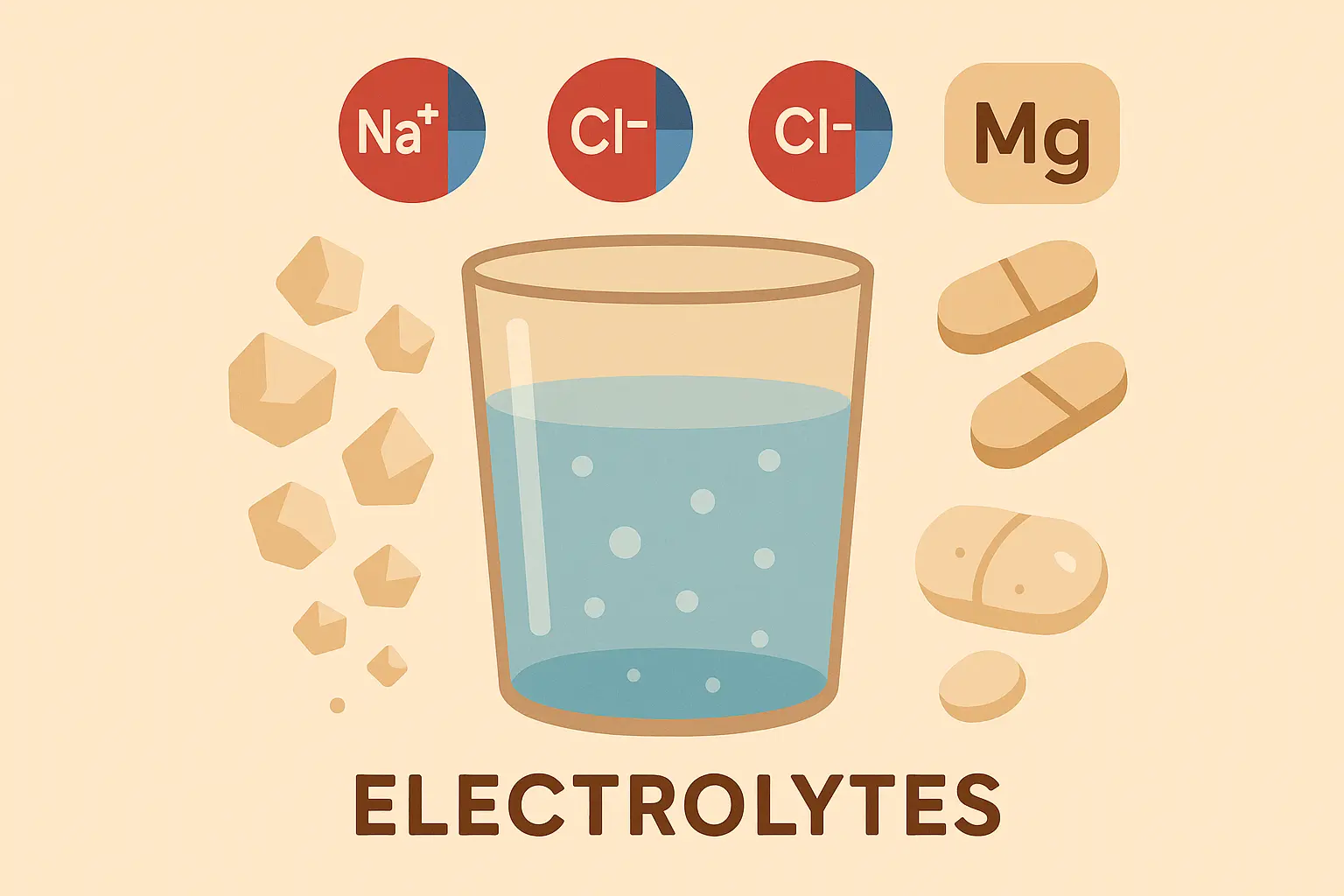
The Fatigue-Dizziness Connection Most People Miss
What many people interpret as separate symptoms are actually interconnected manifestations of the same dehydration cascade. Fatigue represents early metabolic disruption while dizziness indicates more advanced circulatory compromise. Understanding this progression allows you to intervene at the optimal point before symptoms become debilitating.
When Your Energy Crash Predicts the Spin
I’ve found that tracking energy levels every 3 hours using a simple 1-5 scale can prevent dizziness episodes entirely. When energy drops to 2 or below, implementing immediate hydration protocols often stops the progression before spatial disorientation begins. The key is recognizing that fatigue isn’t just tiredness – it’s your first warning that cellular energy production is compromised.
Why Your Headache Is Actually a Gift
Dehydration headaches and dizziness share common vascular mechanisms, with headaches often serving as a 15-30 minute early warning system before spatial disorientation begins. Instead of just treating the headache, use it as your cue to implement targeted rehydration before the dizziness cascade fully develops.
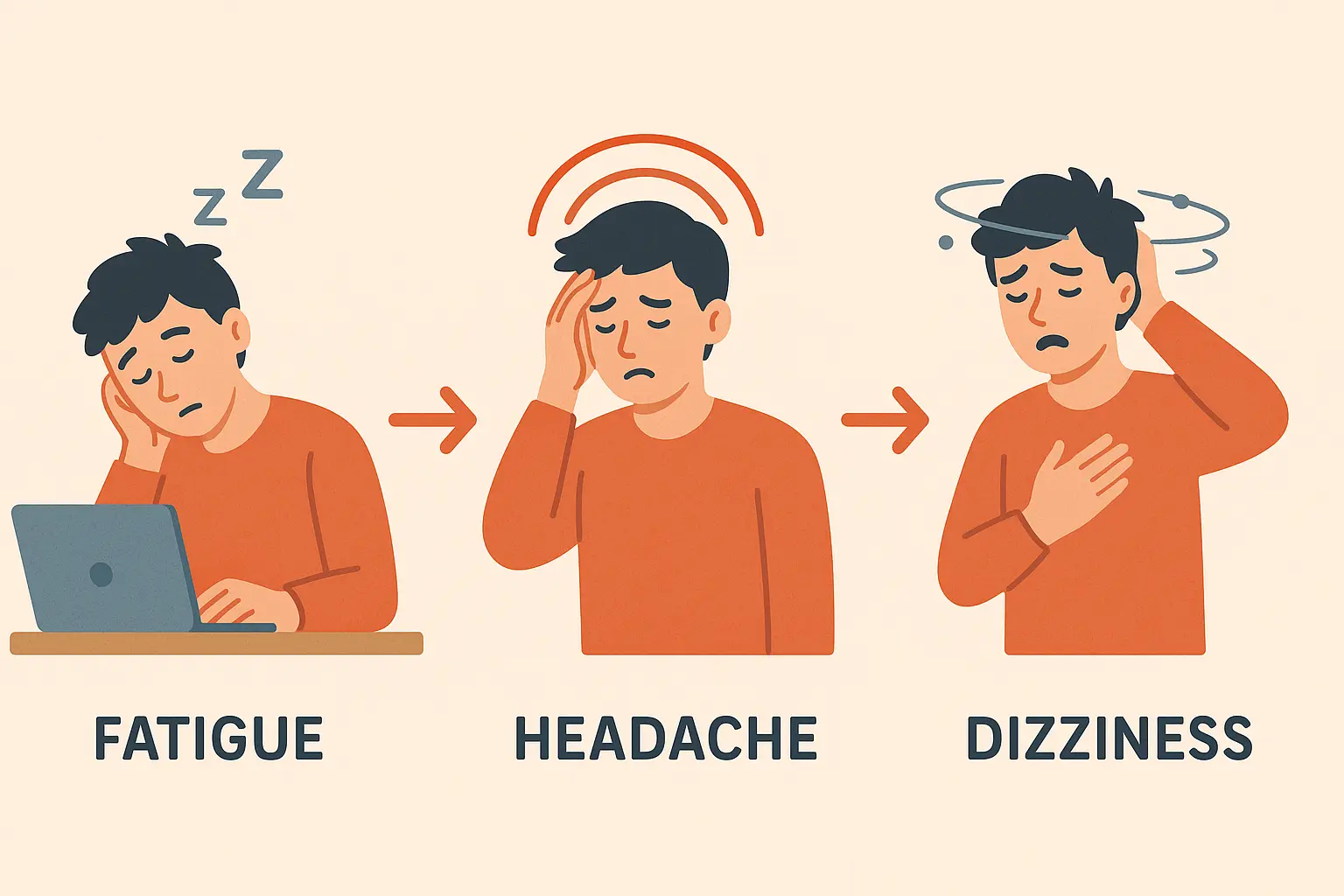
The Individual Variation Factor Nobody Talks About
Here’s something that’ll blow your mind: your personal dehydration story is completely different from everyone else’s. I’ve seen people who can go all day without water and feel fine, while others get dizzy after missing just one glass. It’s like how some people can eat spicy food without breaking a sweat, while others need milk after one bite of mild salsa.
Individual responses to dehydration are heavily influenced by genetics in personalized healthcare, as genetic variations in hormone receptors and mineral processing determine your unique vulnerability patterns.
Your genes literally determine how sensitive you are to getting dehydrated. Some people have hormone receptors that freak out at the first sign of fluid loss, while others have systems that can tough it out much longer. It’s not fair, but it’s reality.
Figure Out Your Own Pattern
Instead of following some generic “drink 8 glasses a day” advice, you need to become a detective of your own body. Grab a notebook (or use your phone) and track this stuff for two weeks:
- How much you drink and when
- Your energy levels throughout the day (rate it 1-5)
- Any dizzy spells and what you were doing
- How you’re feeling mood-wise
Most people discover they have specific “danger zones” – maybe you always crash at 3 PM, or you wake up dizzy on weekends when you sleep in. Once you know your pattern, you can actually do something about it.
Why Your Friend’s Magic Solution Might Make You Worse
You know how your coworker swears by chugging a huge sports drink when she feels dizzy? That might work great for her but could make you feel worse. Maybe her body processes sodium differently, or she sweats more, or her kidneys work differently than yours.
This is why those one-size-fits-all hydration tips on social media can be so frustrating. What works for the fitness influencer with perfect genetics might leave you feeling more dizzy than before.
The Recovery Timeline Reality Check
Okay, here’s the part that nobody talks about: even after you drink water, you might still feel crappy for a while. This used to drive me crazy until I understoo d what was actually happening.
Even after proper rehydration, some symptoms can persist for hours due to inflammatory processes and cellular recovery needs. Understanding this timeline prevents panic and helps you implement appropriate support strategies during the recovery phase.
Why Chugging Water Doesn’t Instantly Fix Everything
When you’re dehydrated and dizzy, your body has basically been running in crisis mode. Even after you drink fluids, your system needs time to calm down and get back to normal. It’s like when you’re really stressed and someone tells you to “just relax” – your body can’t flip a switch and instantly feel better.
The inflammatory cascade triggered by dehydration can continue even after fluid levels normalize. Inflammatory chemicals that crossed into your brain need time to clear, and cellular energy systems require hours to fully restore optimal function. This explains why sometimes you still feel off even after rehydrating properly.
Your brain might still have some of those stress chemicals floating around, your blood pressure might still be doing weird things, and your cells are still trying to get their energy production back online. This whole process can take a few hours, not a few minutes.
What to Do While You Wait
During the recovery phase, gentle movement, avoiding sudden position changes, and continuing mineral support can help speed resolution of lingering symptoms. Your balance system needs time to recalibrate, and pushing too hard too fast can actually prolong the recovery period.
During this recovery time, be gentle with yourself:
- Don’t jump up and start moving around like everything’s fine
- Keep sipping fluids slowly instead of stopping once you feel a little better
- Avoid sudden movements that might trigger another dizzy spell
- Maybe grab a small snack with some salt (pretzels, anyone?)
Think of it like nursing a hangover – you wouldn’t expect to feel 100% immediately after drinking some water, right? Same principle applies here.
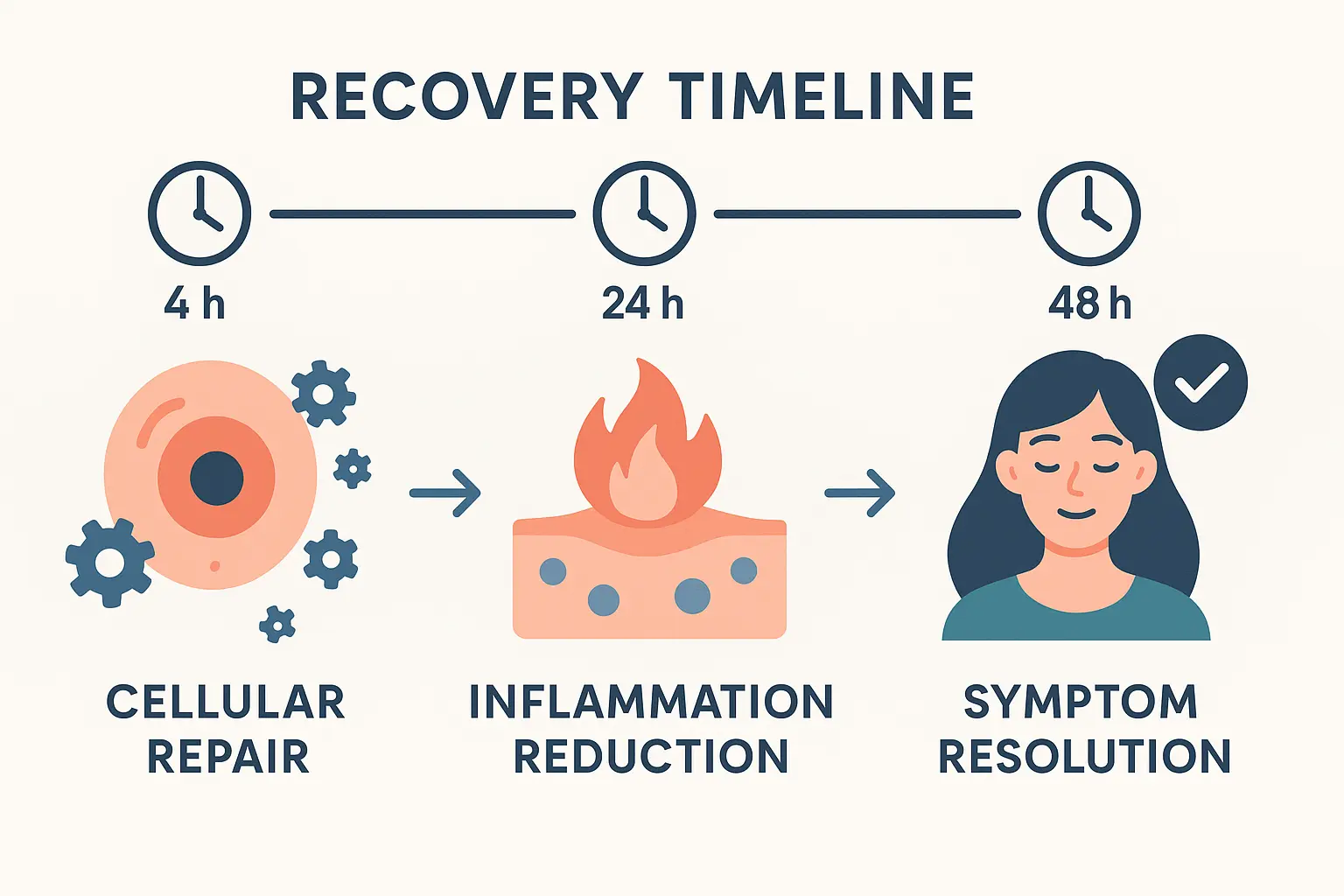
How Enov.one Tackles Dehydration-Related Dizziness
Look, after everything we’ve talked about, you might be thinking “This is way more complicated than I thought.” And you’re right – it is. That’s where having actual medical professionals who understand all these connections comes in handy.
Understanding these complex mechanisms reveals why a personalized approach to health optimization is crucial for addressing dehydration-related dizziness. Enov.one’s comprehensive telemedicine platform addresses these interconnected systems through targeted interventions that go beyond simple hydration advice, incorporating detailed health assessments, smart supplementation programs, and real-time monitoring to prevent episodes before they occur.
Enov.one doesn’t just tell you to “drink more water and call us in the morning.” They actually dig into why your body might be more sensitive to dehydration in the first place. Maybe you need specific vitamins, or your hormones are out of whack, or you have some underlying issue that makes staying hydrated harder for you.
Enov.one’s comprehensive approach includes targeted NAD+ therapy to support cellular energy production and B12 injections to optimize nervous system function, addressing the root causes of dehydration sensitivity.
They use real data from wearables and lab tests to figure out your personal hydration needs, instead of guessing. Plus, they can prescribe things like IV therapy or specific supplements that actually address the root cause of why you keep getting dizzy.
Enov.one’s platform can identify your individual vulnerability patterns through detailed assessments and wearables data integration, tracking hydration status, sleep quality, and stress responses that contribute to dizziness episodes. Their targeted nutritional support addresses underlying mineral imbalances, magnesium deficiencies, and B-vitamin needs that make some people more susceptible to dehydration-induced dizziness.
For those experiencing chronic dehydration sensitivity, Enov.one’s hormone therapy services can address underlying cortisol dysregulation, fluid-regulating hormone imbalances, and other hormonal factors affecting fluid balance. Their comprehensive monitoring system integrates wearables data with regular check-ins for real-time tracking and proactive intervention.
The cool part is they track everything over time, so you can see what’s actually working for your specific situation. No more trying random internet advice and hoping for the best.
Ready to stop playing guessing games with your health? Schedule a consultation with Enov.one to develop your personalized hydration and wellness optimization plan.
Final Thoughts
Here’s the bottom line: feeling dizzy from dehydration isn’t just about being thirsty. Your body is basically a complex machine with lots of moving parts, and when you don’t give it enough fluid, things start breaking down in ways you never expected.
Dehydration-induced dizziness isn’t just about drinking more water – it’s a complex interplay of vascular, neurological, metabolic, and hormonal systems that requires a sophisticated understanding to address effectively. By recognizing your personal patterns, implementing targeted intervention strategies, and addressing the root causes rather than just symptoms, you can prevent these episodes from disrupting your life.
The good news? Once you understand what’s actually happening and figure out your personal patterns, you can stay ahead of the problem instead of always playing catch-up. You don’t have to live with random dizzy spells or feel like your body is unreliable.
Start paying attention to your own signals, experiment with what works for you, and don’t be afraid to get professional help if you need it. Your body is trying to communicate with you – you just need to learn its language.
The key is moving beyond the simple “drink more water” advice to understand how your unique physiology responds to fluid loss and what specific interventions work best for your body’s particular needs. And remember: everyone’s different. What works for your friend, your coworker, or some person on TikTok might not work for you, and that’s totally normal. The key is finding your own solution, not copying someone else’s.
